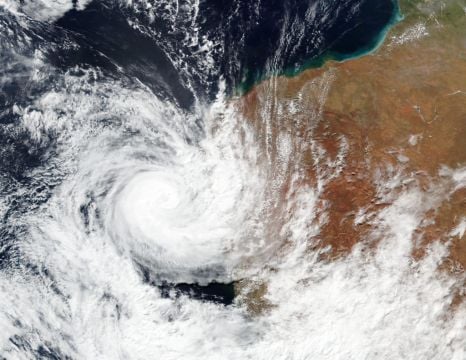A destructive cyclone has damaged several towns on Australia’s western coast, shattering windows, snapping trees and knocking out power.
Tropical Cyclone Seroja crossed the Western Australia state coast south of the tourist town of Kalbarri with winds gusting up to 106mph shortly after dark on Sunday, officials said.
There are no reports of any injuries.
Seroja's track across WA first as a Cat 3 Severe Tropical Cyclone crossing the coast & eventually as a Tropical Low. No more severe weather is expected. We will continue to serve the communities affected and work with all relevant agencies to help with recovery efforts as we can pic.twitter.com/N9gYxDKr3T
— Bureau of Meteorology, Western Australia (@BOM_WA) April 12, 2021
Advertisement
Around 70% of buildings in Kalbarri, a town of 1,400 people 360 miles north of the state capital Perth, had been damaged, Department of Fire and Emergency Services Commissioner Darren Klemm said.
About 30% of that damage was “significant”, he added.
Other coastal towns sustained less damage.
Government utility Western Power reported 31,500 customers had lost power.
The remnants of Seroja will continue to weaken during the morning but is still likely to result in damaging wind gusts, and heavy rain close to the track. A Severe Weather Warning is current at https://t.co/QF3c8gn6tD #CycloneSeroja https://t.co/B1MVXBYXhh pic.twitter.com/uJToRu9eBK
Advertisement— Bureau of Meteorology, Western Australia (@BOM_WA) April 11, 2021
Such powerful cyclones are rare in subtropical Australia.
Wind gusts recorded in Kalbarri and nearby areas were likely to have been the “strongest in more than 50 years”, Australia’s Bureau of Meteorology said.
The last comparable cyclone in the region struck in 1956. It brought 87mph gusts to the port town of Geraldton, 100 miles south of Kalbarri, where there was no weather station at the time.
Cyclone Seroja caused flooding and landslides that killed at least 174 people and left 48 missing in Indonesia and East Timor last week.
The damage was worse in some parts of Kalbarri than others, but the whole town had been affected, local State Emergency Service manager Steve Cable said.

Power lines and trees were toppled, homes lost roofs and streets were strewn with debris.
“Some of the older buildings didn’t stand up very well. But even some of the modern buildings, they just couldn’t hold it,” Mr Cable said.
“Large trees with quite substantial limbs just snapped off like carrots,” he added.
Debbie Major weathered the storm in a room of a Kalbarri tourist trailer park that she manages, clutching a door to prevent it blowing open as broken tree limbs shattered windows.
“I’ve never experienced anything in my life that we experienced last night,” Ms Major said.
“It was terrifying.”
Cyclone Seroja lost power and was downgraded to a tropical low before blowing out to sea near Esperance on Monday.







